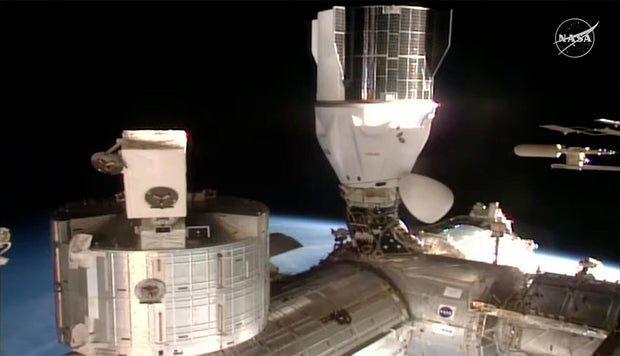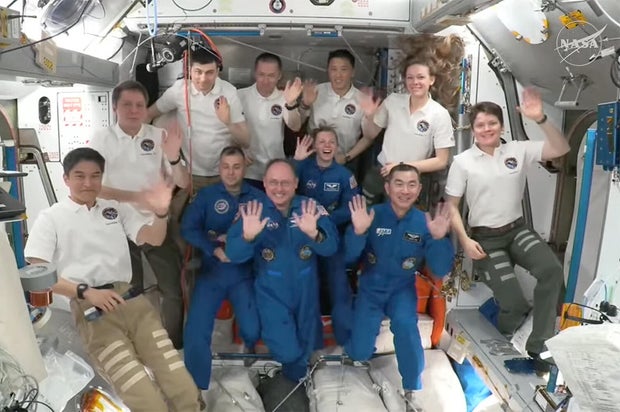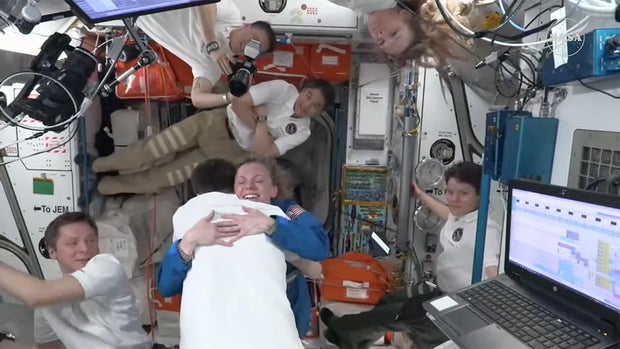A SpaceX Crew Dragon capsule homed in on the International Space Station early Saturday and glided in for a problem-free docking, delivering two NASA astronauts — a Russian cosmonaut and a Japanese flier — to the outpost after a 16-hour rendezvous.
Catching up from behind and below, the Crew 11 Dragon Endeavour looped up ahead of the lab complex, then to a point directly above the outpost before slowly moving straight in for a linkup at the space-facing port of the forward Harmony module at 2:27 a.m. ET as the two spacecraft orbited 264 miles above the south Pacific Ocean.
NASA TV
Hooks and latches then engaged, pulling the Crew Dragon’s nose firmly into the docking mechanism, which locked the craft in place. Umbilicals automatically connected and flight controllers began a series of leak checks to verify an airtight structural seal.
“Endeavour, welcome to the International Space Station,” called NASA astronaut Jonny Kim from inside the ISS. “Zena, Mike, Kimi and Oleg, we have cold drinks, hot food and hugs waiting. See you soon.”
“Hello space station, Crew 11 is here!” Endeavour pilot Mike Fincke, a three-flight veteran, enthusiastically replied. “And we are super excited to join Expedition 73. We will do our best to also be good stewards of our beautiful ISS during our stay. The ISS has been inhabited and crewed for almost 25 years. We look forward to celebrating with you.”
Nearly three hours later, after doffing their spacesuits and configuring their capsule for docked operations, Fincke, Crew 11 commander Zena Cardman, making her first flight, Japanese veteran Kimiya Yui and rookie cosmonaut Oleg Platonov floated through the forward hatch to be welcomed aboard by the space station’s seven-member crew.
NASA TV
“We are so happy to see your smiling faces,” said ISS commander Takuya Onishi. “Zena, Oleg, congratulations on your first spaceflight. We are looking forward to hearing your impressions and your feelings about that. Mike and Kimiya, welcome back. Your experience will be an invaluable asset for Expedition 73.”
Cardman was bumped from a Crew Dragon flight last year to help NASA bring two Starliner astronauts back to Earth after problems prevented them from coming home on their own spacecraft. She was clearly thrilled to finally be aboard the space station.
“This has been the absolute journey of a lifetime,” she said with a broad smile. “We are so incredibly grateful to be here. Thank you so much for this warm welcome. It was such an unbelievably beautiful sight to see the space station come into our view for the first time, especially with these wonderful crewmates.”
With the arrival of Crew 11, four of the station’s crew members — Crew 10 commander Anne McClain, pilot Nichole Ayers, Onishi and cosmonaut Kirill Peskov — will be clear to undock and return to Earth next Wednesday to close out a 145-day mission.
The other three — Kim and Soyuz MS-27/73S crewmates Sergey Ryzhikov and Alexey Zubritsky — will remain aboard with Cardman and company to continue Expedition 73.
NASA TV
Until now, long-duration crews, U.S. and Russian, have typically spent around six months in orbit. But starting with the Soyuz MS-27/73S mission, the Russians have switched to eight-month stays. NASA may follow suit with Crew 11.
The Trump administration’s proposed budget for fiscal 2026 would reduce NASA funding by nearly 25% while directing the agency to scale back work aboard the ISS in favor of more aggressive planning for eventual crewed missions to Mars.
NASA managers are now considering lengthening crew stays and possibly reducing Dragon crews from four to three. A reduced crew would need fewer resupply missions, saving additional money.
No final decisions have been made. But NASA is assessing the possibility of extending Crew 11’s stay in space from six to eight months, depending on the actual funding outlook.
“I can’t wait to be in space, and two extra months would be a gift,” Cardman said before launch. “Yes, we’re baselined for six months right now, with the ability to extend that pending further analysis. For me, it would be an absolute privilege to stay for even longer.”



